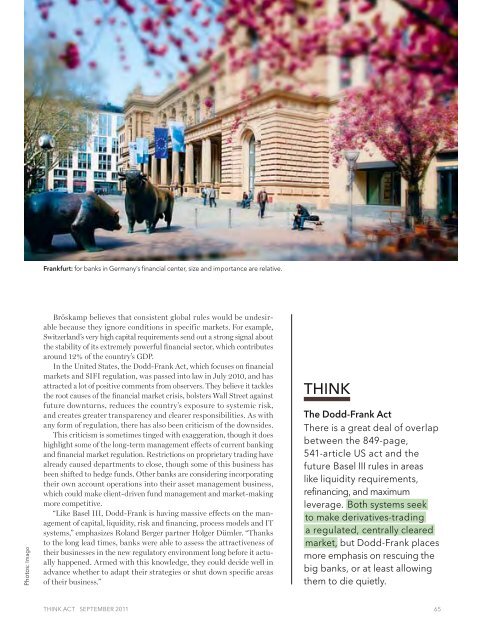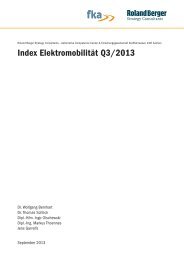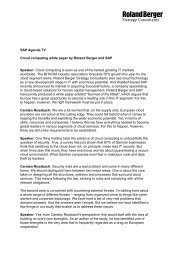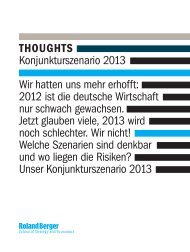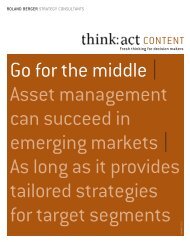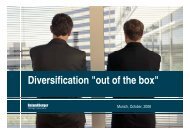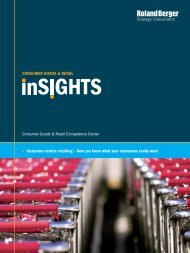ACT: BankingregulationsThis gives a total capital requirement of between 8% and9.5%, as opposed to the 7% applying to all banks underBasel III. The IMF has calculated that even 7% wouldcreate an additional requirement of USD 360 m for theworld’s 62 largest banks.The ex<strong>act</strong> surcharge depends on which of the four categoriesof systemic importance the institution falls into. Thefinancial institution’s balance-sheet total is one yardstick,and the Basel committee has recommended that four additionalbenchmarks be used: interconnectedness, globalreach, complexity, and substitutability by other providers.In the United States, the Dodd-Frank Act defines a bankthat is “too big to fail” as one with a balance-sheet totalof over USD 50 bn. Below this level, it is not systemicallyimportant. At the international level, a more complex formulahas been used which takes different business modelsinto account, and is compatible with the Basel III rules.Although SIFIs initially rejected the criteria, they willnow have to exceed them and they are starting to get usedto their newfound status. Of course, increased solvencyrequirements will erode their margins, but this could beoffset by the advantages of refinancing.The calculation is that as highly stable SIFIs, financialinstitutions will earn better ratings and achieve lower riskpremiums than banks with less capital, thereby establishingthemselves as safe havens for investors in bonds andcertificates. There are also benefits for deposit-taking businessbecause, as Deutsche Bank CEO Josef Ackermann pointsout, customers “would rather invest their money with SIFIs.”At first, shareholders were alarmed by the prospectof their companies retaining profits to create additionalbuffers or increase capital. <strong>No</strong>w they are starting to seethe silver lining – this will make their investments moreattr<strong>act</strong>ive and lower-risk.Dodd-Frank Act attr<strong>act</strong>s widespread praiseWhatever people <strong>think</strong> about Basel III and SIFIs, there is nodoubt that the industry’s situation will change drastically –not just for SIFIs, but for all providers. There will be nogenerous transition periods; it will happen immediately.Banks without adequate capital and financing could beforced to withdraw from previously attr<strong>act</strong>ive areas of themarket and pass on their expensive refinancing costs toclients, which will reduce their competitiveness. Conversely,the changes would create additional opportunities forfinancial services providers that revalue their businessesto allow for risks as part of an overall banking strategy.“It’s potentially quite a simple question,” says UdoBröskamp, head of <strong>Roland</strong> <strong>Berger</strong> Strategy Consultants’Competence Center financial services. “How do I makethe best use of my capital in the future?”It’s potentially a simplequestion: “How do I makethe best use of my capitalin the future?”However, he says, the answer is more complicated becausebusinesses need to take into account the indirect effects of thenew rules and their own national laws. “Some countries havealready pressed ahead on banking regulation, while otherswill take their time implementing it, possibly making creativeuse of the SIFI criteria to give domestic banks a temporarycompetitive advantage.”Adopting such an approach to industrial policy coulddo more harm than good. <strong>No</strong>n-SIFIs may <strong>think</strong> that lowerequity requirements have given them a head start, but sooneror later they could be forced to maintain higher voluntarybuffers to signify their solvency to the market, where theinvestors will not necessarily know how institutions havebeen classified by regulators.For example, big banks whose business is primarilydomestic could have huge balance sheet totals but still beplaced in lower categories, or left out of the equationaltogether. If the experience of the recent financial marketscrisis is indicative, it seems likely that a big domestic bankwith its fingers in lots of pies could cause just as muchdamage as a SIFI if it crashed.There have been dire warnings that banks could simplyshift their business to regions with more relaxed rules;however, this is largely a ploy by lobbyists. “In reality, there’slimited scope for regulatory arbitrage,” Bröskamp says. “Firstin terms of time, because rules tend to converge as the yearsgo by, and secondly, geographically, because you can’t justmove and take your customers with you.”64 THINK Act september 2011
Rubrik hierFrankfurt: for banks in Germany’s financial center, size and importance are relative.Photos: ImagoBröskamp believes that consistent global rules would be undesirablebecause they ignore conditions in specific markets. For example,Switzerland’s very high capital requirements send out a strong signal aboutthe stability of its extremely powerful financial sector, which contributesaround 12% of the country’s GDP.In the United States, the Dodd-Frank Act, which focuses on financialmarkets and SIFI regulation, was passed into law in July 2010, and hasattr<strong>act</strong>ed a lot of positive comments from observers. They believe it tacklesthe root causes of the financial market crisis, bolsters Wall Street againstfuture downturns, reduces the country’s exposure to systemic risk,and creates greater transparency and clearer responsibilities. As withany form of regulation, there has also been criticism of the downsides.This criticism is sometimes tinged with exaggeration, though it doeshighlight some of the long-term management effects of current bankingand financial market regulation. Restrictions on proprietary trading havealready caused departments to close, though some of this business hasbeen shifted to hedge funds. Other banks are considering incorporatingtheir own account operations into their asset management business,which could make client-driven fund management and market-makingmore competitive.“Like Basel III, Dodd-Frank is having massive effects on the managementof capital, liquidity, risk and financing, process models and ITsystems,” emphasizes <strong>Roland</strong> <strong>Berger</strong> partner Holger Dümler. “Thanksto the long lead times, banks were able to assess the attr<strong>act</strong>iveness oftheir businesses in the new regulatory environment long before it <strong>act</strong>uallyhappened. Armed with this knowledge, they could decide well inadvance whether to adapt their strategies or shut down specific areasof their business.”ThinkThe Dodd-Frank ActThere is a great deal of overlapbetween the 849-page,541-article US <strong>act</strong> and thefuture Basel III rules in areaslike liquidity requirements,refinancing, and maximumleverage. both systems seekto make derivatives-tradinga regulated, centrally clearedmarket, but Dodd-Frank placesmore emphasis on rescuing thebig banks, or at least allowingthem to die quietly.THINK Act september 2011 65


